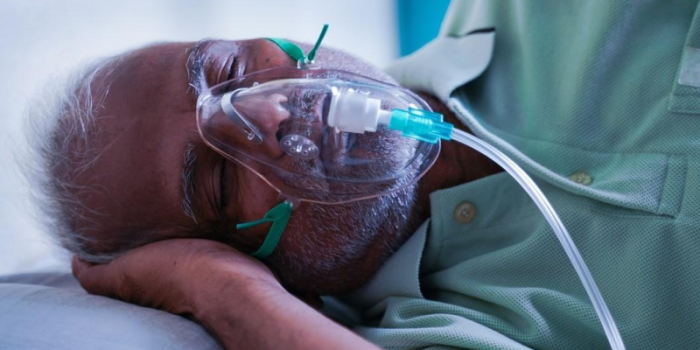A pair of new studies highlight respiratory syncytial virus (RSV) in US adults, with one estimating 75% vaccine effectiveness (VE) against medically attended illness in the 2023-24 respiratory virus season in older adults and the other suggesting that oxygen-dependent RSV patients with chronic lung disease are at the greatest risk for intensive care unit (ICU) admission and acute organ failure across age-groups.
Lowest VE after stem cell transplant
For the first study, published late last week in JAMA Network Open, researchers from Case Western Reserve University used a test-negative case-control design to assess the VE of RSVPreF3+AS01 (Arexvy, made by GSK) and RSVPreF (Pfizer’s Abrysvo) against RSV infection, urgent care or emergency department (ED) visit, or hospitalization among adults aged 60 years or older from October 2023 through April 2024. Follow-up was 90 days.
Of the 787,822 participants who were tested for RSV, 6.8% tested positive, and the remainder served as negative controls. A total of 2.4% of RSV patients and 9.1% of controls were vaccinated.
Estimated VE was 75.1% (95% confidence interval [CI], 73.6% to 76.4%) against respiratory infection and was similar for those aged 60 to 74 years and those 75 years or older and against urgent care visits or hospitalizations.
For patients with weakened immune systems, VE ranged from 67.0% (95% CI, 62.6% to 70.9%) for those aged 60 to 74 years to 73.1% (95% CI, 69.9% to 76.0%) for those 75 years or older. The lowest VE (from 29.4% [95% CI, 3.5% to 48.4%] for patients aged 60 to 74 to 44.4% [95% CI, 1.0% to 68.8%] for those 75 years and up) was noted among recipients of a stem-cell transplant.
VE was similar to that reported by clinical trials, the authors noted.
RSV vaccines for older adults were first approved and recommended in the United States in 2023. The next year, RSV vaccination guidelines were revised to recommend a single vaccine dose for all adults aged 75 years and older and those aged 60 to 74 who have medical conditions that confer increased risk of severe illness.
Guillain-Barre syndrome risk
While no excess risk of immune thrombocytopenic purpura (ITP) was observed among 4,746,518 vaccine recipients, an excess 5.2 cases (RSVPreF3+AS01 vaccine) and 18.2 cases (RSVPreF) of Guillain-Barre syndrome (GBS) were diagnosed for every 1 million doses of administered vaccine.
The risk of Guilain-Barre syndrome was statistically significantly elevated in patients who received the RSVPreF vaccine but not in those who received RSVPreF+AS01 vaccine, although the risk was small.
ITP is a condition in which the immune system destroys platelets, leading to abnormal bleeding, and GBS occurs when the immune system attacks peripheral nerves, which causes muscle weakness and, in some cases, paralysis.
“Risk of immune thrombocytopenic purpura after vaccination was not elevated, but the risk of Guilain-Barre syndrome was statistically significantly elevated in patients who received the RSVPreF vaccine but not in those who received RSVPreF+AS01 vaccine, although the risk was small,” the study authors wrote. “These observations should inform clinicians’ choices and patient instructions.”
Risk factors for patients younger than 60
The second study, which has not been peer-reviewed, was published late last week on the preprint server medRxiv. Led by researchers from the US Centers for Disease Control and Prevention (CDC), it involved 1,111 adults hospitalized for RSV at 1 of 26 hospitals in 20 states from January 2022 to July 2024.
The aim was to estimate the risk of severe RSV-related ICU admission, acute organ failure, invasive mechanical ventilation (IMV), or death related to 17 underlying medical conditions among patients aged 18 to 59 years (387 patients) and 60 years or older (714).
Of the 397 RSV patients aged 18 to 59 years, 24.2% were admitted to an ICU, 29.7% experienced acute organ failure, and 8.1% required IMV or died. ICU patients more often had severe obesity (25.0% vs 14.3%) and four or more underlying conditions (28.1% vs 8.3%).
Among patients aged 18 to 59 years, the two identified underlying-condition profiles and related risks: (1) fewer underlying conditions (minimal prevalence profile; 78%; median number of conditions, 1; posterior median ICU admission risk, 20.5%), and (2) cardiorenal/diabetes profile (22%), with frequent heart failure, chronic kidney disease, diabetes, and increased ICU admission risk (37.1%).
Risk profiles for patients aged 60 or older
Of the RSV patients aged 60 or older, 23.0% were admitted to an ICU, 31.5% had acute organ failure, and 9.8% received IMV or died. ICU patients more frequently had severe obesity (12.8% vs 8.9%) and at least four underlying conditions (28.0% vs 17.5%).
Adults hospitalized with RSV of all ages with a cardiorenal and diabetes profile and adults aged ≥60 years with chronic pulmonary disease and home oxygen dependence were at increased risk for severe outcomes.
In this age-group, four profiles were identified: (1) minimal condition prevalence (64%; ICU admission risk, 21.6%), (2) cardiorenal/diabetes (26%; ICU admission risk, 27.3%), (3) hematologic malignancy and transplant receipt (7%; ICU admission risk, 11.8%), and (4) chronic pulmonary disease with home oxygen dependence (3%; ICU admission risk, 44.0%). Similar risk differences were seen for acute organ failure, IMV, or death.
“Adults hospitalized with RSV of all ages with a cardiorenal and diabetes profile and adults aged ≥60 years with chronic pulmonary disease and home oxygen dependence were at increased risk for severe outcomes,” the authors wrote. “These findings could support recognition of high-risk patients to inform RSV prevention strategies and suggest that the role of multimorbidity in increasing severe RSV disease risk warrants further attention.”













